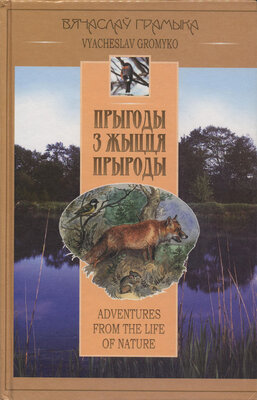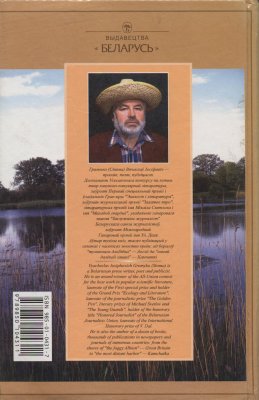Прыгоды з жыцця прыроды
Adventures from the life of nature
Вячаслаў Грамыка
Выдавец: Беларусь
Памер: 263с.
Мінск 2003
Though not only this is interesting, not only this explains elevated mood during hunting.
Imagine a fine winter day. Light frost nips your ears slightly. Everything around is white. Snow surface is iridescent and sparkles under the rays of the winter sun. Trees are motionless, wrapped up, like the ground, into white snowy shawl. It seems that everything around had been created specially to please you, to open for you the fantastic beauty and unique freshness of winter.
Sometimes a hunter would stay in a quiet winter morning and listen to the muffles run of hares. The beagle goes easily, but without particular excitement, you may hear measured barking
on the same note. And you know that so far it is barking for the sake of propriety. But suddenly you hear a real, excited, furious barking. At once the hunter feels beating in his temples, the sound of the heart is booming, his hands strongly squeeze his double-barreled gun and he whispers with emotion:
“Had gone on the red!”
Is there a single hunter who doesn't recall again and again later on those thrilling moments?
The “red beast” is a relative collective name. It is analogical to old Slavonic word combinations: red fish, red spring, red girl. It means the best, the most beautiful, the very elite itself. Only three beasts had been granted the “honor” to be in this list: wolf, vixen and lynx. And to bag them is always the greatest desire of even the most experienced hunter. Today everyone standing at the posts was longing for his luck. Though responsibility was, too, as high as ever. In case you miss, the villagers will laugh you to scorn and Kuzmich will give you no quarter. But so far everything was quiet.
Meanwhile, the beaters were moving on. Here one dog gave tongue. As if in time, another one answered from the side. Here Kuzmich, with all his force, struck a stick against a tree trunk and cried out in a hoarse voice:
“Ho-ho-ho-ho-ho! Hopp-pa!”
As it had been agreed, other beaters also enlivened, made much noise. Hand-made rattles began cracking, heavy stakes started beating against the trees now and again. Some of the beaters took out ordinary metallic spoons from out of the bosom and began beating them one against the other.
Wolves rose to their paws from the habitual place. Making huge leaps, the mature she-wolf rushed to the side, young wolves followed it. The keen-witted leader brought up the pack, but all of a sudden the she-wolf stood still. Ominous tongues, as though aflame, swung on the bushes and the she-wolf could smell man. It rushed in the opposite direction, the pack followed it. Mighty long leaps again...
The voice of people became more and more expressive, the dogs were very close. Keeping together they would not survive. The pack scattered off and every wolf began searching the way for salvation.
Hopelessly wolves rushed to the left, to the right, backwards and the dogs were “at the tail end” already. The she-wolf was the first to have thrown itself onto the “clear line.” The rest dashed in the same direction.
But, out of the blue people with awful “lethal thunder makers” stood up on their way. Wolves used to meet such creatures before and they were well aware how dangerous it was.
The first aimed shot rent the air. The wolves that ran out to the neighborhood post, following the she-wolf, were met by the hunters in proper time. The shots thundered in the frost air one after the other. Then suddenly they died down.
The hunters were nibbing their hands satisfactorily, not a single predator managed to cross the shooting line. All of them were killed. The beaters came out of the forest already. Kuzmich also showed up. Understanding that the work had been done, he took his gun off the shoulder and blew loudly into the barrels, which meant “all clear”.
The marksmen were dragging killed wolves to one place. They were scattered all over the snow with their bared fangs.
Carriages had arrived. Carcasses were dragged to them to be loaded and taken to the village. Skins could have been taken off at the place, but they could not but show them to people so as everybody might see the success of hunters and, most important, be sure that their cattle would not be endangered by anyone.
But having felt the wolves' smell, horses became frightened, they whinnied watchfully and pranced. They had to be held back by the harness.
Now, when they tried to load the wolves on the sledges, Kuzmich suddenly realized that there were only five of them! But, according to his estimation, there were six wolves inside the battue. He could not have made a mistake!
Kuzmich passed along the shooting line carefully, a little bit further from the front edge, and made sure that not a single predator had really crossed it.
But not a single beast of prey was able to cross the battue line. It was impossible!
The old forester quickly examined the victims. Four completely developed young wolves and the mature old and fat she-wolf
were among them. But the mature male was absent. So, he had to check the battue sections.
All flags were in place, the line remained classically strained and untouched as before. Snow surface within the battue was densely trampled with tracks of people, dogs and wolves.
Then the forester began inspecting the place of the battue from the outside and as son as he ran about a hundred and a half steps along it, he noticed that a sweeping track of very broad imprints of the mature wolfs paws led away from the battue. The old forester had seen much in his life, but after looking at it closely, he even squatted in surprise:
“Look, the mature one leapt over the flags, yokha-makha!”
He heard from other hunters that sometimes, when an old wolf failed to find another way out, it might even leap over the flags, but he had never seen such occasion himself.
“Well, well!” Kuzmich went on exclaiming in surprise. “Even here the wolf has outwitted us. Scoundrel! Well, wait awhile! We'll keep you in check.”
As for himself, he understood perfectly that then it would be almost impossible to get to that mature wolf. It had gone through fire and water.
Anyway one wolf will not inflict much damage. How much does it need? Wild game and animals will be enough and the main thing is that, after such a fright, it would hardly appear soon in the nearest neighborhood. Shortly speaking, so far farmers and villagers could breathe with relief.
So that great hunt ended in that way; everybody left the farmstead for his hut.
There were neither any argument nor envy during the sharing of the prey, the most important was that the wolves had been exterminated.
Kuzmich was taken home with honor as it befits the winner, in a carriage with the best stallion.
***
Spring was approaching. It became noticeably warmer at daytime, the sun was rising higher in the sky. Sparrows began
chirping boisterously around the homestead, tomtits whistled loudly in bare gardens.
The snow on the hillocks started to melt and at midday the first turbulent streamlets were making their way from under it. Day by day they grew in number, the streams merged and ran down from high hillocks.
If in the beginning people talked much about the hunt, later on, occupied with spring troubles, they recalled the past more and more rarely and then they seemed to have forgotten it completely, as much is forgotten from people's life as time passes.
Spring works were started in the fields: at first people took organic manure out and spread it, then prepared the soil for sowing; after that plowmen went out into the fields. Farmers began sowing spring crops, potatoes, beetroots and other vegetables.
Soon everything around sprang up profusely and impetuously. The air was filled with the fragrance of fresh vegetation and multitude of flowers. The whole multicolored interlacing made man's heart happy.
Meanwhile, days were passing by. Fine June days were outdoors already. The time when the sun, from morning till night, caresses the earth with its rays and grasshoppers boomingly chirp in the meadows. The rains were warm and short.
***
The summer was just in the period when days became so long, that once the sun hid behind the horizon, it soon again peeped out at the eastern dome of the sky. So, the night even had no time to cast the film of cool fog onto the ground when the dawn dispersed it, laying it on the ground with large drops of silver dew.
It was just the time when many berries appear in the forest. Red-cheeked strawberries, black bilberries with a slight foggy bloom attracted both people and wild inhabitants of the forest. Even occasional beasts of prey, such as weasel, stoat, marten, which feed on animal food at other times, at that period regaled
themselves satisfactorily with the gifts of the forest. Raccoons and badgers were spending whole days on the berry fields.
Brown bear ate berries with delight in dense raspberry canes. With the help of huge clumsy paws it grabbed them from the branches together with leaves and put them into his mouth, then slowly sucked swallowing the sap. That is why other wild animals, even when they wanted to regale themselves with sweet raspberries, would not dare to risk and appear in those places and were satisfied with the berries, which grew on the ground or tried to savor raspberries from the remote bushes.
It seemed that rains, as if by chance, became more frequent during several days. They fell just on the time when rye, having let the young ear out, was covered with light earrings.
And at this time the forest mushrooms come out. They are boletuses, chanterelles, orange cup boletuses, brown cap boletuses and field mushrooms. They grow as if on yeast.
When first mushrooms appeared my father, no matter how busy he was, still managed to find time to gather them. It seemed even that he liked to gather them more than to eat. But at the time when there was not very much food, a basket of “vegetable meat” was desirable for the family.
During this period mushrooms keep growing not very long and actually in a week and a half they disappear as suddenly as they had begun springing up. As soon as rye forms ears, mushrooms immediately disappear in the forest and again they will spring up only close to Fall, making mushroomers happy for a longer period. Some of the mushrooms grow until late September, others, for example, honey fungus, may bring some happiness with the richest yields even in November and such as saffron milk caps and brown cap boletuses last until the first frosts in fact, though at this time they are not many in the bare forest. But so far it is as if the first airborne force is being baled out and coincides with the period when rye ears are formed, that is why these mushrooms are called cereal mushrooms. No matter what it might be — chanterelle, brown cap boletus or even boletus itself — all the same, they are called similarly — a cereal mushroom.
 КНІГІ ОНЛАЙН
КНІГІ ОНЛАЙН


